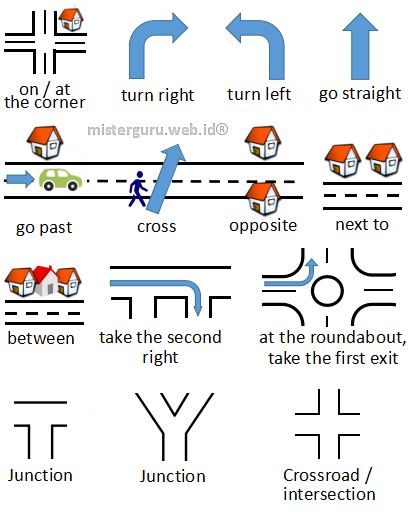Apa yang ada di sini?
I. Struktur Past Perfect Tense
Struktur Past Perfect tense cukup mudah untuk diingat dan dipahami. Untuk kalimat positif, lihatlah struktur berikut:Subject + auxiliary verb "HAD" + Past participle (VERB 3)
(Subyek + kata kerja bantu "HAD" + kata kerja bentuk ke-3)Untuk daftar Verb 3 irregular verbs, lihat di SINI
- (+) I had been there. / I'd been there.
(?) Had I been there?
(-) I had not been there. / I hadn't been there - (+) He had worked hard. / He'd worked hard.
(?) Had he worked hard?
(-) He had not worked hard. / He hadn't worked hard. - (+) They had gone away. / They'd gone away.
(?) Had they gone away?
(-) They had not gone away. / They hadn't gone away.
- Untuk kalimat tanya (interrogative / question), letakkan kata kerja bantu "had" di depan subyek. Contoh; "Had they gone?"
- Untuk kalimat menyangkal (negative), tambahkan "not" di belakang kata kerja bantu "had". Contoh; "They hadn't gone?"
- Dalam percakapan, had seringkali disingkat dengan cara yang sama seperti saat kita menyingkat kata would menjadi 'd. Perbedaannya ada pada kata kerja yang mengikutinya. Pada Past Perfect tense, 'd selalu diikuti oleh verb-3 (past participle), sedangkan kata "would" yang disingkat menjadi 'd selalu diikuti oleh verb-1 (infinitive). Contoh:
- They'd gone = They had gone.
- They'd go = They would go.
- She'd sung = She had sung.
- She'd sing = She would sing.
II. Penggunaan Past Perfect Tense
Bagaimana dan kapan kita menggunakan bentuk Past Perfect Tense?- Past Perfect Tense digunakan untuk membicarakan kejadian/tindakan yang terjadi sebelum sebuah kejadian/tindakan lainnya terjadi di waktu lampau. Jadi, Past Perfect Tense menunjukkan kejadian/tindakan yang terjadi lebih dulu sebelum kejadian/tindakan lainnya. Contoh:
- The train left at 7am. We arrived at 7.10am. When we arrived, the train had left. The train had left when we arrived.
- The fact that he came late wasn't surprising to me. It had happened a few times before.
- Past Perfect Tense digunakan sebagai bentuk yang setara dengan Present Perfect tense, misal dalam kalimat tidak langsung (Indirect / Reported speech). Contoh:
- He said, "I have submitted the report." ~ He said that he had submitted the report.
- She said, "I've lost my wallet." ~ She said that she had lost his wallet.
- Past Perfect Tense digunakan dalam kalimat Conditional (If - conditional) tipe ke 3. Kalimat conditional tipe ke 3 ini digunakan untuk mengungkapkan pengandaian tentang kejadian / keadaan di masa lampau yang tidak sesuai dengan fakta yang sebenarnya. Contoh:
- If you had arrived ten minutes earlier, you wouldn't have missed the train. (Fakta: you didn't arrive ten minutes earlier and you missed the train)
- He would have been soaking wet if he hadn't worn a raincoat. (Fakta: He wasn't wet because he wore a raincoat.)
- Sama halnya dengan when pada penggunaan pertama (no. 1) di atas, Past Perfect Tense bisa digunakan bersama Simple Past tense as soon as, the moment, immediately, till/until, before, after untuk menegaskan atau memperjelas bahwa kegiatan atau peristiwa yang dimaksud terjadi atau selesai dilakukan sebelum kegiatan lainnya di masa lampau. Contoh:
- When he had shut the window, he turned on the AC.
- Before we had reached the basecamp, the rain poured down.
- They were very tired. They (work) hard all day.
- I didn't know her. I (never met) her before.
- When the accident happened, I (finish) working at my garden.
- They found out that some burglars (break) into their house.
- When the cops arrived, the thieves (run) away.
- Sue did not go to work that day. She (be) sick for a week.
- We (not leave) the meeting room.
- you (arrive)?
- they (had) dinner?
- Some of the students (not do) the assignment.
- Jim (wait) for an hour when the bus (show) up.
- The classroom (look) clean. The students (clean) them when we (get) there.
- We (try) to chase the car after it (hit) the motorist.
- As soon as they (left) the building, it finally (collapse).
- I (hear) about his resignation before you (tell) me.
- Before I (become) a teacher in 2015, I (work) as an Assistant Manager for 6 years.
- The burglars (escape) before the cops (arrive) at the scene.
- If she (read) the announcement, she would have known about the change of schedule.
- Diane (tell) me that she (send) the goods on the previous day.
- The engine (break) after the race (start) for 10 minutes.












